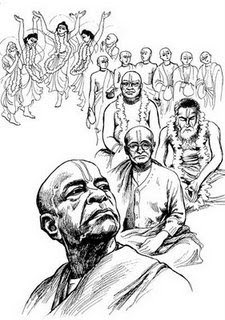
What to Pray For and How Krishna Reciprocates With Our Prayers.
Srila Bhakti Siddhanta Sarasvati Thakura used to pace back and forth on his balcony and pose questions to himself, and then answer them. I do the same in this newsletter. I ask the questions of myself and then answer them. I ask subtle questions that I believe are important for our progress in Krishna consciousness.
I ask about the nature of pure prayer: Is it wrong to pray to Krishna to protect us materially? Is it okay to pray to Krishna to fulfill material desires that would help us in devotional service or make us more peaceful so we can be more steady? And would such prayers indicate a lack of faith in His protection and maintenance?
I also ask if praying can change our karma, if praying is wrong if we don’t endeavor to achieve what we are praying for, do we really need to pray if we are already making a full effort to achieve our goals (what we are praying for), and if Krishna knows everything do we really need to pray to Him at all?
May you always think of Krishna,
Mahatma das
____________
1. Since we all have our individual karma, if we are praying to Krishna to attain something that we are not destined to get according to our karma, can we still get it?
Yes, praying can change our karma. But since karma is Krishna’s law to bring us closer to Him, why would He change it? There is a verse in Bhakti Sandharba that says if we only approach Krishna for material things, Krishna will reciprocate with that foolish person; but he won’t get bhakti. For this reason our mood should not be to ask for material things unless such material things or desires are in relation to Krishna’s service.
Krishna uses our karma to purify us, so if we pray to change that karma we may be praying to Krishna to interfere with His plan for what is best for us. But normally, whatever our karma, Krishna reduces the reactions for us.
Srila Prabhupada said it may be our karma to have our head cut off, but because we are devotees, we only get a cut on our finger. As a devotee becomes purified, he no longer needs purification of his full karma, so it is reduced by Krishna. Also, no matter what kinds of happiness and distress await a devotee, by responding to them in a Krishna conscious way, we are less affected by the happiness and distress. This is one way our destiny changes by surrendering to Krishna, i.e. we see and respond differently to our karma. Plus, we experience greater happiness in devotional service than what our karma can ever bring us.
Being disturbed by happiness and distress is an impediment to bhakti, so if we tolerate them we will be spiritually happy. And by advancement in Krishna consciousness we learn to better tolerate happiness and distress. Ultimately, our desire to pray for something material is about being happy. And by Krishna consciousness we can become many times happier.
Krishna will either reduce our karma or utilize it for our spiritual advancement. Receiving Krishna’s protection means that Krishna does what’s best. Usually our karma is what’s best for us, so Krishna uses it.
The main thing is to always pray in a way that invokes our dormant love.
2. How would you answer the above question in relation to devotees who are mostly engaged with work and family? Is there a difference between how karma affects them and how it affects those who are “fully engaged” in service?
The whole meaning of God is that He reciprocates with His devotees. So it depends on the devotee’s attitude, not ashram or external situation. If one’s ashram affects their spirit of dedication, then it will affect how Krishna reciprocates (“ye yatha mam prapadyante).”
Since every desire we have is known to Krishna, and every desire is really a prayer, is there any difference in the result we obtain by desiring something that we don’t pray for and desiring something we do pray for? The desire itself is the essence of prayer, but prayer is one of the processes of devotional service. So we should pray. Also, praying intensifies the desire. And from the position of rasa, not everything is known to Krishna; He is forgetful if that serves rasa. So it’s best to both desire and pray because maybe He won’t fulfill a specific desire unless we pray for it.
4. If my desire is material, since Krishna already knows what it is, why bother Him by asking Him to fulfill it? Plus, wouldn’t this show a lack of faith and purity since Prabhupada says, “A pure devotee of the Lord is ashamed to ask anything in self interest. But houeholders are sometimes obliged to ask favors being bound by the tie of family affection.”
In distress a devotee will want to seek shelter someplace; so why not seek help from Krishna? That seeking shelter is a natural flavor of love because the servant’s mood of love is that Krishna is my maintainer and protector. Of course with that confidence one may consider that there is no need to ask anything from Krishna because He is already maintaining and protecting us. So according to our faith we will ask – or not ask – Krishna for help. But either way there should be a mood of devotion, i.e. whatever we pray for, even if it is material, should help our bhakti in some way. Still, what we ask for will often depend on our level of faith.
5. Is there some way to purify what may seem to be a materially oriented prayer by praying for it only if I think it will help my service? In this way, although I may pray for a spouse, material security, or health, my mood is that with these things I can better serve Krishna and if He desires to give me these things I will use them for Him?
Yes, if you need to pray and compromise the spirit of love by asking God for something, then try to acknowledge that God’s will is best and what pleases Him most is by asking, as you have suggested, for things that will enhance your service, not your sense gratification. And if you are not sure what you are asking for is proper, you can add the phrase “if you so desire” to your prayer.
6. It seems unproductive, perhaps even useless, to pray for something that we don’t strongly desire and thus don’t actively purse. For example, I could pray to become free of envy but do little or nothing to become non-envious. To me this is like asking someone to help me carry a table and when they lift their end, I don’t lift mine. There is a saying, “Act like everything depends on you and pray like everything depends on God.” So is it improper to pray unless we are willing to make efforts to achieve what we are praying for?
I don’t think it is useless to pray this way because a devotee’s mood is that everything depends on Krishna. It is an acknowledgment that we are not independent of Him, which is the mood of surrender and the gateway to bhakti. So we ask for purity and at the same time the act of praying itself is the consciousness and endeavor for purity. In other words, praying for something that we do not yet strongly desire, and are thus not really pursuing, is still purifying as an act of sadhana, and by acting in this way the pure desire can develop.
We can also pray for the desire to want to become pure.
7. If we have a strong desire for pure devotional service, and thus take care to perform the activities that will help us achieve this, won’t that get us to our goal even if we don’t pray to achieve it? In other words, if I am totally fixed on my goal, isn’t that really the perfection of prayer, the external manifestation of prayer. Or is prayer still necessary?
Prayer is still necessary to keep us in the humble mood of dependence on Krishna to achieve success. Otherwise our determination may turn to into ahankara, thinking that I can achieve everything by my own power.
8. What about prayers to help us out of dangerous situations? A devotee doesn’t ask Krishna for anything yet at the same time is totally dependent on Krishna for protection. In danger ,we pray to Lord Nsmhadeva. Draupadi prayed to Krishna to protect her and Uttara came to Krishna when she saw the brahmastra coming. Only Krishna can protect us so is it wrong or right to seek and ask for protection. Or should we just ask Krishna to protect our devotional service?
In Nectar of Devotion , Srila Prabhupada says we should go to the Lord and reveal our troubles to Him. Prabhupada also said go to Gaura Nitai, tell them your problems, and they will do the needful. Again, if protection is motivated ultimately by the desire to be pure, then such prayers are welcome. Sometimes we circumstantially have to ask Krishna for material help because He is our only shelter and we are in great difficulty. And the nature of such prayers and dependence will reflect the level of our advancement. So although we want to elevate the quality of our prayers to not have to ask Krishna for anything on our own account, we also want to be real when we pray.
9. It seems there is a fine line between accepting a situation and praying to change a situation. When we pray for changing a situation that we can personally do nothing to alter, we may be putting ourselves into a mind set in which we will be unable to deal with the consequences if the situation doesn’t change. Is there a guideline?
Sometimes we need to pray for the strength to deal with the situation rather than pray to change the situation. “Krishna, please give me the strength, intelligence and ability to deal with the challenges that I face.”
10. What about the prayers of one who asks the Lord to save him from the ocean of birth and death? Can we say that on the platform of vaidhi, this is appropriate, but on higher platforms of bhakti it is not? And how does this relate to the question about praying to Krishna for protection?
For a neophyte, a prayer to be saved from the ocean of birth and death is in accordance with his level of advancement. He is suffering in the material world and wants to get out. This suffering is a strong impetus for him to be Krishna conscious. For a more advanced devotee, he wants to be free from the ocean of birth and death in the sense of, “Place me as an atom at your lotus feet.” He always wants to serve the Lord, free from all material impurities, be it in heaven or hell.




 By Ananda Vrindavaneswari Devi Dasi
By Ananda Vrindavaneswari Devi Dasi

 By Sri Nandanandana dasa
By Sri Nandanandana dasa  By Kesava Krsna Dasa
By Kesava Krsna Dasa By Giriraj Swami
By Giriraj Swami






 Putrada Ekadasi
Putrada Ekadasi Six loving exchanges Among devotees(Seminar)
Six loving exchanges Among devotees(Seminar) Japathon-Congregational Mantra Meditation
Japathon-Congregational Mantra Meditation Monthly sankirtan Festival(MSF)
Monthly sankirtan Festival(MSF) IB Vaishnavi Sanga
IB Vaishnavi Sanga
 The Mentorship Program
The Mentorship Program


 By Satsvarupa Das Gosvami
By Satsvarupa Das Gosvami





 By Daamodara Dhananjaya Das
By Daamodara Dhananjaya Das
 By Subhananda Hari Das
By Subhananda Hari Das